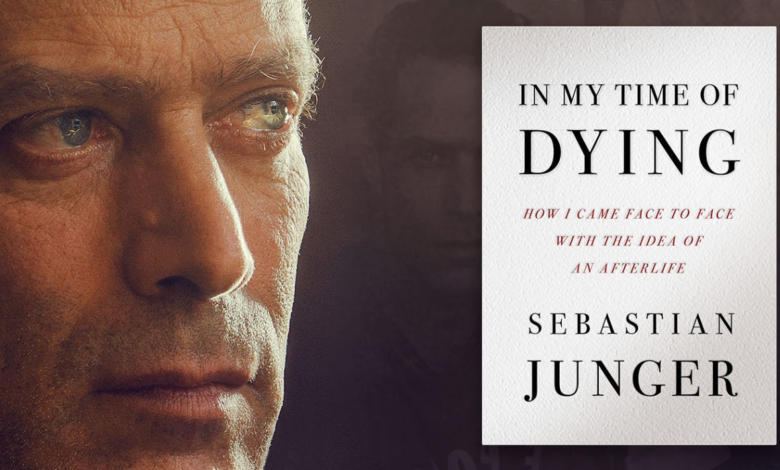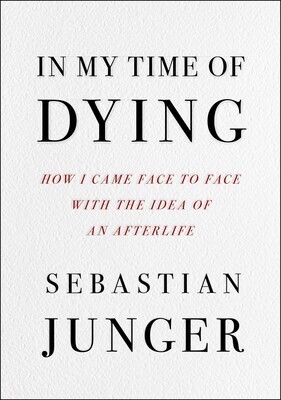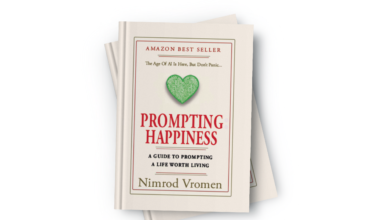Book Review: In My Time of Dying By Sebastian Junger
How I Came Face to Face with the Idea of an Afterlife

Book title: In My Time of Dying: How I Came Face to Face with the Idea of an Afterlife
By Sebastian Junger
168 pages, $14.99
Publication: May 21, 2024
Sebastian Junger, renowned journalist and author, has chronicled the human experience in ways few others have. Now, at 61, the acclaimed writer of “The Perfect Storm” and “War” turns inward with “In My Time of Dying: How I Came Face to Face with the Idea of an Afterlife,” a deeply personal and philosophical exploration of mortality and what may lie beyond.
This introspective journey began after Junger’s own near-death experience during a reporting assignment. This pivotal moment sparked a quest for understanding, akin to a mid-life odyssey that has flipped his world upside down—this time, with profound reflections on life and death.
You may know Junger from his riveting documentaries and books that delve into the human condition amid extreme circumstances. On the podcast “Ground Truth,” you might have heard him discussing the perils of war reporting; on “Survival Stories,” his insights into the nature of fear and bravery are compelling. More recently, Junger has shared his thoughts on mortality and the afterlife in interviews promoting his new book. His dedication to exploring these profound topics is unwavering.
Years ago, Junger’s work focused on external struggles—nature’s fury, the chaos of combat, the bonds of brotherhood. Now, with decades of experience behind him, he returns with a new perspective on the ultimate internal struggle: facing death and contemplating the afterlife.
With “In My Time of Dying,” Junger offers a narrative that is part memoir, part philosophical inquiry, and part spiritual journey. The book showcases his profound realizations and insights, brought to life through his exceptional storytelling. “We prompt ourselves towards understanding,” he explains, “by engaging with our deepest fears and existential questions.”
Junger suggests that like explorers of old, we navigate our own existential quests, seeking truths about life and death. Who knew our most profound journeys might not be physical but deeply internal?
Challenging simplistic views on death and the afterlife is another critical theme. Junger encourages readers to “regularly question and explore the varied beliefs and scientific theories about what happens after we die,” moving beyond clichés to find personal truths.

In examining relationships, Junger highlights our dual roles: “In our connections with others, we are both explorers and navigators—constantly seeking deeper understanding based on feedback and shared experiences.” This metaphor underscores the dynamic and evolving nature of human relationships and our collective search for meaning.
Expanding one’s perspective is vital for Junger. He suggests to “engage with different cultural and philosophical viewpoints to enrich our understanding of mortality and the afterlife.” This broadens one’s empathy and awareness, helping to form a more holistic view of life and death.
According to “In My Time of Dying,” personalization of beliefs is essential. “Periodically revisit and refine your beliefs about death and the afterlife to ensure they resonate with your evolving understanding and experiences.” This approach keeps one’s perspective relevant and adaptive to personal growth.
Assuming a mindful approach to death is crucial for peace: “In contemplating mortality, start with the assumption that life’s end is a natural part of our journey, and seek to understand its role in our existence.” This fosters a balanced and accepting mindset.
You may be asking, is there life after death? The answer, according to Junger, is a deeply personal and complex one.
“In My Time of Dying” is a poignant, thought-provoking exploration of one of humanity’s most profound mysteries. Sebastian Junger’s blend of personal narrative, rigorous investigation, and philosophical inquiry makes this book a compelling read for anyone interested in the afterlife. The book does not offer definitive answers but instead invites readers to ponder their own beliefs and feelings about death and what might follow.
Junger’s shift from his usual topics of conflict and survival to a more introspective subject showcases his versatility as a writer. This book is a testament to his ability to tackle deeply personal and universal themes with the same intensity and insight that has marked his previous works. It is a must-read for those intrigued by the eternal question of what happens after we die.



